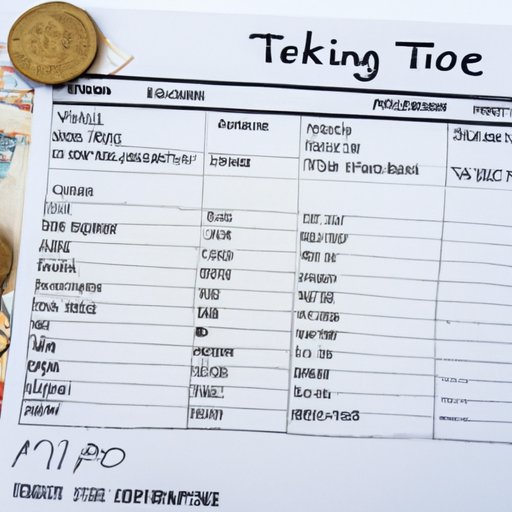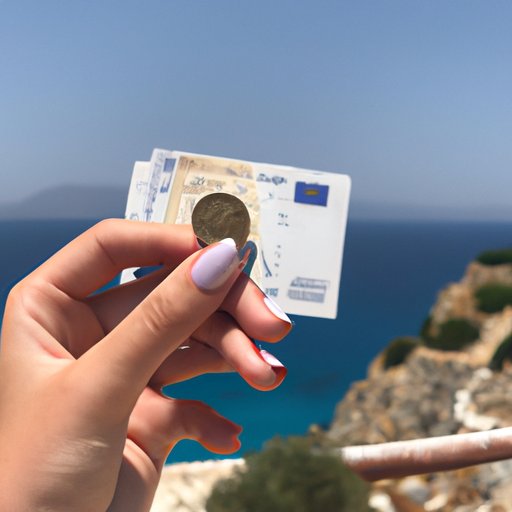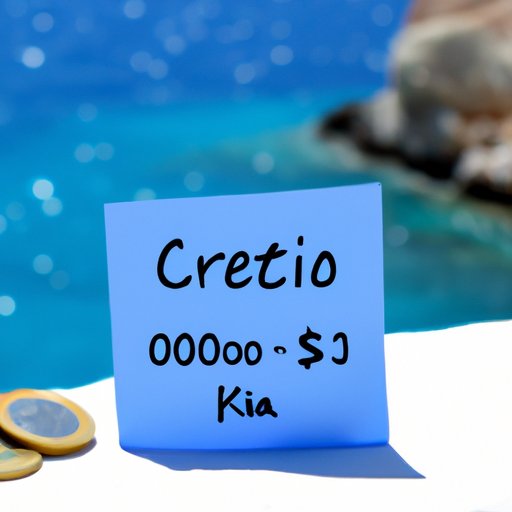An Overview of the Cost of a Trip to Greece
Greece is an incredibly popular tourist destination, known for its stunning landscapes, ancient ruins, rich culture, and delicious cuisine. Many people dream of visiting this incredible country, but are often intimidated by the cost. The good news is, with some careful budgeting, a trip to Greece can be surprisingly affordable. Here’s an overview of what you can expect to spend on your Greek getaway.
General Costs
The cost of a trip to Greece will vary depending on your travel style and preferences. Generally speaking, you can plan to spend anywhere between $50-$200 per day. This includes costs like accommodations, transportation, food, drinks, activities, and miscellaneous expenses.
Accommodation Costs
Accommodation costs in Greece can range from as little as $20-$30 per night for a shared hostel room, to several hundred dollars per night for a luxury hotel. According to a study conducted by the World Tourism Organization, the average cost of a hotel room in Greece was €93.38 ($106 USD) per night in 2019.
Transportation Costs
Getting around Greece isn’t overly expensive. The most economical way to travel is by bus or train, which both cost around €10-€15 ($11.50-$17.25 USD) per journey. You can also rent a car, which will cost anywhere from €35-€50 ($40-$57 USD) per day. For longer distances, flying is the quickest option, but can be quite expensive.
Food and Drinks Costs
Food and drinks are one of the biggest expenses when traveling in Greece. Eating out at a restaurant will cost between €10-€20 ($11.50-$23 USD) per meal, while grabbing a quick snack from a café or street vendor will cost around €3-€5 ($3.45-$5.75 USD). As for drinks, beer and wine are relatively inexpensive, costing about €4-€6 ($4.60-$6.90 USD) per glass.
Activities and Attractions Costs
Entry fees for attractions in Greece usually range from €5-€15 ($5.70-$17.25 USD). For example, admission to the Acropolis costs €20 ($23 USD), while the Temple of Poseidon in Sounio costs €12 ($14 USD). Other activities, such as boat tours, cooking classes, and guided hikes, may cost more.
Miscellaneous Costs
In addition to the above costs, you should also budget for miscellaneous expenses like souvenirs, tipping, and transportation between airports and cities. These costs can add up quickly if you’re not careful, so it’s important to keep track of your spending.
How to Budget for a Vacation in Greece
When planning a trip to Greece, it’s important to establish a budget and stick to it. Here are a few tips for budgeting for your Greek getaway:
Estimate Your Travel Expenses
Start by researching the costs of accommodations, transportation, food, drinks, activities, and other expenses. Estimate how much you think you’ll spend each day and create a budget accordingly. This will help you stay on track and avoid overspending.
Use Online Tools to Track Your Spending
There are a variety of online tools that can help you track your spending while traveling. By keeping tabs on your expenses, you can make sure you’re staying within your budget.
Consider Setting Aside Money for Unexpected Expenses
No matter how well you plan, there’s always a chance that unexpected expenses will arise. Consider setting aside a portion of your budget for these types of surprises.

A Breakdown of Expenses for Visiting Greece
Now let’s take a closer look at the different costs associated with a trip to Greece. Here’s a breakdown of expenses for accommodation, transportation, food and drinks, activities and attractions, and miscellaneous items.
Accommodations
Accommodation costs in Greece depend on the type of accommodation you choose. Hostels, apartments, and budget hotels are generally the most affordable options, while luxury hotels and villas tend to be more expensive. Prices can range from as little as €20-€30 ($23-$34 USD) per night for a shared hostel room, to several hundred euros per night for a luxury hotel.
Transportation
Getting around Greece is fairly affordable. Bus and train tickets typically cost €10-€15 ($11.50-$17.25 USD) per journey, while renting a car will set you back €35-€50 ($40-$57 USD) per day. Flying is the quickest option for long distances, but it can be expensive.
Food and Drinks
Food and drinks are one of the biggest expenses when traveling in Greece. Eating out at a restaurant will cost between €10-€20 ($11.50-$23 USD) per meal, while a quick snack from a café or street vendor will cost around €3-€5 ($3.45-$5.75 USD). Beer and wine are relatively inexpensive, costing about €4-€6 ($4.60-$6.90 USD) per glass.
Activities and Attractions
Entry fees for attractions in Greece usually range from €5-€15 ($5.70-$17.25 USD). For example, admission to the Acropolis costs €20 ($23 USD), while the Temple of Poseidon in Sounio costs €12 ($14 USD). Other activities, such as boat tours, cooking classes, and guided hikes, may cost more.
Miscellaneous
In addition to the above costs, you should also budget for miscellaneous expenses like souvenirs, tipping, and transportation between airports and cities. These costs can add up quickly if you’re not careful, so it’s important to keep track of your spending.
What You Can Expect to Spend on a Trip to Greece
The cost of a trip to Greece depends on a variety of factors, including where you go, what type of accommodation you choose, and how much you plan to do and see. Here’s a closer look at what you can expect to spend on your Greek getaway.
Costs Vary Depending on Your Destination
The cost of a trip to Greece will vary depending on where you go. Popular destinations like Athens, Santorini, and Mykonos tend to be more expensive than less crowded areas like Crete. Do your research and compare prices to find the best deals.
Different Types of Accommodations Have Different Prices
Accommodation costs in Greece depend on the type of accommodation you choose. Hostels, apartments, and budget hotels are generally the most affordable options, while luxury hotels and villas tend to be more expensive. Prices can range from as little as €20-€30 ($23-$34 USD) per night for a shared hostel room, to several hundred euros per night for a luxury hotel.
Transportation Costs Depend on Where You Go
Getting around Greece is fairly affordable. Bus and train tickets typically cost €10-€15 ($11.50-$17.25 USD) per journey, while renting a car will set you back €35-€50 ($40-$57 USD) per day. Flying is the quickest option for long distances, but it can be expensive.
Food and Drink Prices Vary by Location
Food and drinks are one of the biggest expenses when traveling in Greece. Eating out at a restaurant will cost between €10-€20 ($11.50-$23 USD) per meal, while a quick snack from a café or street vendor will cost around €3-€5 ($3.45-$5.75 USD). Beer and wine are relatively inexpensive, costing about €4-€6 ($4.60-$6.90 USD) per glass.
Activities and Attractions Have Different Prices
Entry fees for attractions in Greece usually range from €5-€15 ($5.70-$17.25 USD). For example, admission to the Acropolis costs €20 ($23 USD), while the Temple of Poseidon in Sounio costs €12 ($14 USD). Other activities, such as boat tours, cooking classes, and guided hikes, may cost more.

Tips for Saving Money on Your Greek Getaway
Traveling in Greece doesn’t have to break the bank. Here are a few tips for saving money on your Greek getaway:
Research Deals and Discounts
Do some research to find discounts on accommodations, transportation, activities, and attractions. You may be able to find deals and special offers that can help you save money.
Consider Alternate Accommodations
Hostels, apartments, and budget hotels are generally the most affordable options for accommodation in Greece. If you’re willing to sacrifice a bit of comfort, these types of accommodations can help you save money.
Utilize Public Transportation
Buses and trains are the cheapest way to get around Greece. Investing in a rail pass can help you save even more money on transportation costs.
Find Cheap, Local Restaurants
Eating out in Greece can be expensive. To save money, try to avoid tourist traps and opt for cheap, local restaurants instead.
Look for Free or Low-Cost Activities
Many activities in Greece are free or low-cost. Take advantage of free walking tours, explore parks and beaches, and visit museums during free entry days.

The Average Cost of a Holiday in Greece
So, how much does an average trip to Greece cost? According to a survey conducted by the World Tourism Organization, the average cost of a holiday in Greece was €1,229 ($1,408 USD) per person in 2019. This included costs like accommodation, transportation, food and drinks, activities, and miscellaneous expenses.
How Much Does an Average Trip to Greece Cost?
According to the World Tourism Organization, the average cost of a holiday in Greece was €1,229 ($1,408 USD) per person in 2019. This included costs like accommodation, transportation, food and drinks, activities, and miscellaneous expenses.
Factors That Impact the Cost of a Trip to Greece
The cost of a trip to Greece will vary depending on a variety of factors, such as where you go, what type of accommodation you choose, and how much you plan to do and see. Research prices for different destinations, accommodations, and activities to find the best deals.
Tips for Staying Within Your Budget
When planning a trip to Greece, it’s important to establish a budget and stick to it. Research prices for accommodations, transportation, food and drinks, activities, and other expenses, and use online tools to track your spending. Consider setting aside money for unexpected expenses, and look for deals and discounts when possible.
Conclusion
A trip to Greece can be surprisingly affordable with some careful budgeting and planning. Use the tips above to plan your Greek getaway and stay within your budget. With a bit of research, you can find great deals on accommodations, transportation, food, drinks, and activities, so you can enjoy all that Greece has to offer without breaking the bank.
(Note: Is this article not meeting your expectations? Do you have knowledge or insights to share? Unlock new opportunities and expand your reach by joining our authors team. Click Registration to join us and share your expertise with our readers.)
